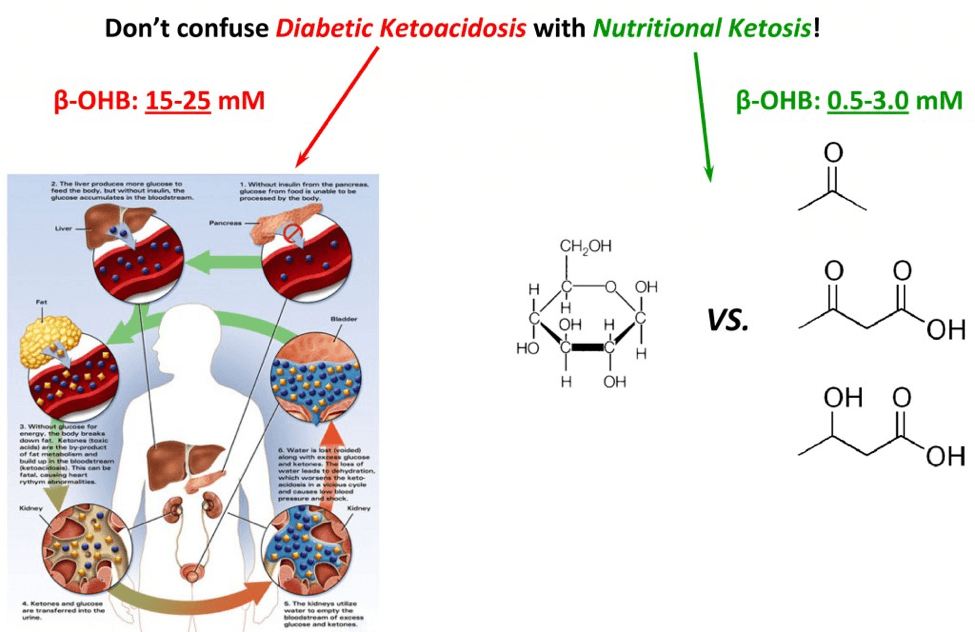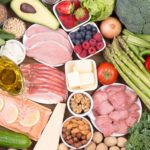You may have heard from your doctor that ketosis is a life-threatening condition. If so, your doctor is confusing diabetic ketoacidosis (DKA) with nutritional ketosis, or keto-adaptation.
First, some semantics. Our body can produce, from fat and some amino acids, three ketone bodies (a “ketone” refers to the chemical structure where oxygen is double-bonded to carbon sandwiched between at least 2 other carbons). These ketone bodies we produce are: acetone, acetoacetone, and beta-hydroxybutyrate (B-OHB). [For anyone who is interested, they are the 3 most right structures on the figure, below.]
Why do we make ketones? For starters, it’s a vital evolutionary advantage. Our brain can only function with glucose and ketones. Since we can’t store more than about 24 hours’ worth of glucose, we would all die of hypoglycemia if ever forced to fast for more than a day. Fortunately, our liver can take fat and select amino acids (the building blocks of proteins) and turn them into ketones, first and foremost to feed our brains. Hence, our body’s ability to produce ketones is required for basic survival.
What is diabetic ketoacidosis? When diabetics (usually Type I diabetics, but sometimes this occurs in very late-stage, insulin-dependent, Type II diabetics) fail to receive enough insulin, they go into an effective state of starvation. While they may have all the glucose in the world in their bloodstream, without insulin, they can’t get any into their cells. Hence, they are effectively going into starvation. The body does what it would do in anyone – it starts to make ketones out of fat and proteins. Here’s the problem: the diabetic patient in this case can’t produce any insulin, so there is no feedback loop and they continue to produce more and more ketones without stopping. By the time ketone levels (specifically, beta-hydroxybutyrate) approach 15 to 25 mM, the resulting pH imbalance leads to profound metabolic derangement and the patient is critically ill.
But this state of metabolic derangement is not actually possible in a person who can produce insulin, even in small amounts. The reason is that a feedback loop prevents the ketone level from getting high enough to cause the change in pH that leads to the cascade of bad problems. A person who is said to be “keto-adapted,” or in a state of nutritional ketosis, generally has beta-hydroxybutyrate levels between about 0.5 and 3.0 mM. This is far less than the levels required to cause harm through acid-base abnormalities.
Keto-adaption is a state, achieved through significant reduction of carbohydrate intake (typically to less than 50 grams per day) and moderate protein, where the body changes from relying on glycogen as its main source of energy to relying on fat. Specifically, the brain shifts from being primarily dependent on glucose, to being primarily dependent on beta-hydroxybutyrate. This has nothing to do with what a diabetic patient is experiencing in DKA, but does illustrate how poorly informed and quick to react the medical community is. DKA and nutritional ketosis (or keto-adaptation) have as much in common as a house fire and a fireplace.
Photo by Andrew Yardley on Unsplash








Hi ,
I am really very upset and depressed today . I have come out of ketoises and have so have swelling in my body .please can someone answer
Thanks
Hi,
Recently diagnosed with Type II diabetes, a weight of 103kg and a history of severe hypertension from the age of 16, I need o lower my weight and get in control of my diet to prevent furthering my diabetes. I was referred here and a few other sites. I am lucky my doctor is okay with me doing the lchf lifestyle change. However, I am struggling to find basic meal plans online to direct me which would be helpful. I have cut (for the most part) simple carbs out of what I am eating (no bread/no rice/no potatoes) except when I slip up and I’ve only been doing this a month so I’m happy that on most days I manage to stay away from anything that isn’t a complex carb. I’ve increased my fats and protein but I’m still not sure I’ve got it right. Apart from my doctor there are no known resources in my city that I can turn to.
Can you direct me?
Helen, I hope this entire blog is a helpful resource for you, as the underlying problem in T2D is insulin resistance.
Hi Peter,
Have you come across any research on side effects from HFLC eating and hypothyroidism? I have tried, with no success, to lose 15 pounds using HFLC. I began in January. After reading, tinkering, realizing I was making many of the same mistakes as others here (too much protein, too little fat, too many calories) I began an 80-5-15 (and 1500-1800 cals or so) eating plan a month ago. I lost three pounds initially, but it came back on as the month progressed. More concerning to me was the tight chest and chest pain I experienced. I took in the recommended amounts of sodium, magnesium, and water to counteract the side effects of ketosis. I do take medication (88/100 mcg synthroid EOD and 5 mcg Cytomel daily) for hypothyroidism. I actually stopped my small daily dosage of Cytomel as I thought my heart was “revving” a bit too much for my comfort. The chest discomfort did not stop until I took a break from the HFLC. While the palpitations have ceased since I have stopped the HFLC five days ago, my weight has popped up another five pounds. I assume it is from the increased carbs and will either settle down in a few days. Interesting side bar: though I reverted to eating low calorie and mod carbs (1300 or so calories, 75-90 gr. carbs) my weight has gone up.
It is so frustrating to read about others’ experiences and success with this way of eating. I feel like I can make it through the difficult transition part (the nausea can be debilitating, especially in the evening) but I don’t get the weight loss that others do here, plus the strange chest side effect.
Last side note: I am a 47 year old, healthy and active female. No health issues aside from thyroid. Perhaps peri-menopausal.
Thanks,
Amy
Great question, Amy. I was having lunch with Chris Kresser yesterday and we actually talked a bit about this. I do plan to summarize all of this info in the next while, but until then, I think you’ll get great value out of his work on this topic: https://chriskresser.com/thyroid
I’m in ketosis, not on purpose, i don’t eat much. But i do eat carbs. For several months now. There’s no way a doctor would even know. I am sick, don’t understand,
So during the normal process of a ketogenic diet, something I’m doing now going on about two weeks, what does the typical insulin activity look like throughout the day? I seem to remember reading that it was going to be naturally higher in the morning after I wake up, but can’t seem to find that definitively.
I’ve recently dropped my protein intake a little after listening to an interview with you and saw nearly immediate results so this made more curious as to the overall pattern of insulin throughout the day assuming a genuinely ketogenic diet.
Highly depended on timing and type of meal.
I am a believer in low carb high fat diets. I started one after reading What Makes Us Fat by Gary Taubes. However, I am breastfeeding a 1 month old son. Could ketosis be harmful to him? Your thoughts would be greatly appreciated.
Dawn, lots of data show that very low GI carb diets are entirely safe in ketosis. Furthermore, many cultures lived in ketosis and breastfed. However, I am not aware of a study that directly addresses your question. Perhaps someone else is. I can’t give you a recommendation, but I can say that eliminating sugars and simple carbs is entirely safe (and probably very beneficial).
Hi Dr. Attia, I am just beginning to look into the idea of Ketosis. Do you have any articles/posts written about how one achieves ketosis specifically? How many grams of protein, carbs, fats, etc? How to know once ketosis has been achieved? Where can I find a good beginners guide that will give me specifics. I am hoping to lose weight and I am already eating paleo (for the past year)- so most of the “hard” work is done.
Thanks!
I don’t have one specific post (yet…it’s on my list), but I’ve pretty much answered every question on the topic throughout the comments section of the first post on “what I eat.” The best book to read on this topic is The Art and Science of Low Carbohydrate Living by Phinney and Volek.
I started this “diet” because for the past year and a half I have lost over 54 pounds. I am now tring to lose the last 20 and for the life of me no matter how clean I was eating my weight wouldn’t budge. My dr told me to try this. He has been doing it now and recommends it to his patients. I started this past Friday and its Tuesday and I have lost SIX pounds. I can’t beleive it. I already feel less bloated all over. I have energy like crazy. I have been using coconut oil as my main source of fat. My question is. I have anxiety and panic disorder I am on meds for it for about 20 years. This forces me to research this constantly and pick out all the negative. I went and bought the ketone strips and they are the purplish they can be. Is it possible to go into ketosis so fast??? It’s been five days. I do not wants anxiety disorder to force me into eating carbs because I am scared something is going wrong and I will die of ketoacidosis or liver failure. These are the thoughts in my head. I know my dr wouldn’t have put me on this unless he thought I was ok. But this is my question. If you have time could you please write back?
Janine
Your doctor recommended a ketogenic diet? Very cool. Please let readers know what city you’re in and who your doctor is. Yes, it’s possible to get into ketosis in a week.
I’ve been doing a nutritional ketosis diet for 3 weeks now. I have lost 10.8 lbs with hopes of another 12-15 lbs. I just got my ketone strips in the mail and tested myself this morning before eating or drinking anything. My ketone level was 5.4 (my glucose was 73). i know the ketone target is between .5-3.0. So my question is what do I adjust to lower my ketones? Do I need to? My target protein is about 66 grams and I get less than 30 grams of carbs a day. I do love this diet. I’m not hungry, I feel good, my mild depression is gone. Should I adjust?
I see no need to do so. Ketone levels in that range would only be problematic for a type I diabetic person.
Thank you so much Dr. Attia for your time and for this blog. I really enjoy how thorough your approach is and love that you examine and pick apart all of the science and the exact biological functions which affect and determine the different conditions and bodily states that we are examining.
I had a question regarding body-building performance in relation to a constant ketotic state. I actually first learned about ketosis by reading opinions and thoughts about body-builders who followed what are called cyclical ketogenic diets (CKDs) and targeted ketogenic diets (TKDs). Most of these people seem to suggest that, while a ketotic state is excellent for reducing the accumulation of excess fat (“cutting”), it is necessary to have a “carb-up” or a “carb-load” where you take a certain day or period of time in your training to consume carbohydrates to restore glycogen levels in the muscles.
I was curious if it is truly necessary to consume at least some carbohydrates to maximize muscle growth or if maximum (or at least, near maximum) muscle growth can be achieved solely in a constant, uninterrupted ketotic state.
Michael, great question. I do not *know* the answer, and I’m not even sure it’s been studied as rigorously as possible. There is so much going on in bodybuilding, and I’m just not sure about the tools and techniques necessary to achieve maximum muscle mass (relative to fat mass). I’m sure there is something out there to point to this, but I’m not an expert on this.
Peter, I am a 52 yo female, Recently just entered menopause and have been low carb for a few months now. I just started going LCHF and am measuring my blood ketones. They range from 0.9 to 1.9 so far, but after 10 days no weight loss. Will I evenly have success and its just taking longer because of age? My carb intake is between 10-20 grams per day. Thank you for any advice you can give me.
So hard to speculate without a lot of information. I’m working on a ketosis post this week, which may provide insight.
Hi Peter,
Just a short word of support…. I check in every day, and read whatever responses to comments you have been able to post. I’m sure that I’m not alone in appreciating the fact that, although you are insanely busy with NuSI, and even try to have a personal and family life, you still pay attention to the many people who are reaching to you for unbiased information they can use in their lives.
I imagine that most people who frequent this blog feel the same gratitude and admiration I have for the fact that you keep contributing so much. This is not even slightly flattery; it’s actually an understatement. Please feel the respect, and, by the way, get some rest.
The NuSI project is one of the most important things that are going on right now, as is this blog. So feel good and carry on. And get some rest.
Thanks,
Bob.
Bob, thank you so much your support. I really appreciate it. Some days it’s tougher than others and I question my sanity for taking on this project with the enormous toll it takes on my personal life. I wish I could say I was completely immune to negative personal attacks which, sadly, happen every week. Of course, for every nut job out there taking a personal swipe at me, there are 19 people like you with only the most encouraging things to say. I do wonder why I allow the 1 of 20 to get to me? Any way, long way of saying, your note means a lot, especially this week.
It’s much easier to believe in the negative,Peter, than the positive. If you listen to all that goes on around you, you will hear that most people willingly believe in the negative and discount the positive with ‘I was lucky’ attitude. It’s something all of us struggle with to some extent. Where does it come from? Who knows and is it really that important to find out the ‘why’? For myself, I have been reading the Second Book of the Tao compiled by Stephen Mitchell. It tells me not to focus on the negative or the positive but to see all as ‘is’. It’s not personal. Odd thing is when I am able to do that (which I am imperfect at doing) the hurt melts away and I am able to move forward.
You could refocus the attacks back on the person who directs it toward you and wonder what in their life makes them take not an approach of respect and helpfulness but one of harm and hurt. I admire what you have done in sharing your struggles and your learning. I admit to a certain amount of difficulty in dealing with some of the things said by you and others. That is my problem, not yours or anyone elses. I’ve refrained brom positing because I’ve noticed a certain caustic tone creeping out in my replies and I needed to step back and reevaluate where I want to come from.
On the other hand, I did read Mistakers Were Made but not by me. I found the discussion intriguing. I kind of got bogged down in the end and really couldn’t understand how a person could recognize cognitive dissonance happening at the time it is happening. It seems to me that only upon reflection can it be discovered. I did wish that the author covered more of the idea of ‘saving face’ I think that happens most of the time. When faced with information that does not match, it isn’t that the information isn’t accepted privately, it means that outwardly it has to be discarded because one ‘must save face’ especially if it is in the area of a person’s speciality. You cannot go against the norm unless you are willing to gamble your job, your professionalism and something else which I am now blanking out on. Oh well…. I guess I’ve gone on long enough.
As the saying goes, Peter, Keep on trucking. You are doing ‘good’
Thanks for your thoughts and reflections, Donna. I speak with Carol Tarvis (author of Mistake Were Made) quite frequently to better understand your exact question.
I can only second Bob’s very well put opinion. On this Thanksgiving there are a lot of people out there who are better off because of the sacrifice you put into this blog, NuSI and the subject in general. And, as one person tells another and the information spreads and starts changing minds, the multiplicative effect of the good done is beyond measurement. From the little insight you have given us as to the wonderful and supportive family you have, they realize this.
You’ve given us a lot to be thankful for Peter. Happy Thanksgiving.
Michele, thanks so much for such kind words.
Peter,
After losing 55 pounds last spring through Ketosis, my wife and I enjoyed our best summer in the last 10 years. I could not believe the spring in my step, the endless endurance I enjoyed on the mountain bike, and feeling like I’d found the fountain of youth. I was reading EatingAcademy 2hours a night, most nights, for most of the summer. Great stuff.
Then, 2 weeks ago, as my 1 month old slept in my arms and my 2 yr old played at my feet, my doctor called and told me I have Lou Gehrig’s Disease (ALS).
The symptoms began last winter with some hand issues, but I thought it was an old riding injury getting arthritic.
Since then, I’ve read about possible effects of the Ketogenic diet delaying the progression of ALS and there is actually a clinical trial on it finishing up this December. When I asked my (highly reccomended) neurologist about any possible interplay between ketosis and ALS progression, she replied “Ketogenic diet causes loss of lean muscle mass which would lead to a quicker loss of breathing capabilites”.
I raised a finger to help emphasis the point I was about to make to her, but when I openned my mouth to speak, all that came out was big fat heavy sigh.
Is this up your alley at all? Do you know anything about theoretical interplay between motor neurons and ketones? I need to do my homework before I go to my first appointment at the ALS clinic.
Since we had the newborn, I’ve been slacking quite a bit on my diet. I think I want to maximize my ketone production to aid against the ALS.
Thanks,
T.Low Tom
Tom, first off I can’t even begin to express my empathy for you and your family. I do not know what you are going through and won’t try to pretend I do. Your question is a very reasonable one and, believe it or not, one I started addressing on the plane yesterday as I work on a post for this week about the real ins and outs of ketosis. Because I can imagine you don’t want to wait a few more days for this post to come out, let me know point you (and your neurologist) immediately in the direction Richard Veech (NIH) and Kieren Clarke (Oxford) who are the leading authorities on ketone esters and neurologic diseases. Not to dump too much on you, but here is a list of their work that I’ve read:
“Ketoacids? Good Medicine?” George F. Cahill, Jr., Richard L. Veech, Transactions of the American Clinical and Climatological Association, Vol. 114, 2003.
“The therapeutic implications of ketone bodies: the effects of ketone bodies in pathological conditions: ketosis, ketogenic diet, redox states, insulin resistance, and mitochondrial metabolism,” Richard L. Veech, Prostaglandins, Leukotrienes and Essential Fatty Acids, 70 (2004) 309-319.
“Ketones: Metabolism’s Ugly Duckling,” TB VanItallie, TH Nufert, Nutrition Reviews, Oct 2003, Vol. 61, No 10, 327-341.
“Brain Metabolism during Starvation,” OE Owen, AP Morgan, HG Kemp, JM Sullivan, MG Herrera, GF Cahill, Jr., J Clin Invest, 1967, Vol. 46, p. 1589-1595
“Ketone Bodies as a Fuel for the Brain during Starvation,” OE Owen, Biochemistry And Molecular Biology Education, 2005, Vol. 33 No. 4, p. 246–251
“Insulin, ketone bodies, and mitochondrial energy transduction,” K Sato, Y Kashiwaya, et. al., including Dr. Richard Veech, Research Communications, The FASEB Journal, Vol. 9, May 1995, p. 651-658
“Brain metabolism during fasting,” OE Owen, AP Morgan, HG Kemp, JM Sullivan, MG Herrera, GF Cahill Jr., J Clin Invest, 1967, Vol. 46, p. 1589-95
“Cerebral metabolic adaptation and ketone metabolism after brain injury,” ML Prins, 2008, Journal of Cerebral Blood Flow and Metabolism, Vol. 28, p. 1-16
“Treatment of Parkinson disease with diet-induced hyperketonemia: A feasibility study,” T. VanItallie, C. Nonas, A Di Rocco, K Boyar, K Hyams and SB Heymsfield, Neurology, 2005, Vol. 64, p. 728-730
“Brain Fuel Metabolism, Aging, and Alzheimer’s Disease,” S. Cunnane, S Nugent, M Roy, et. al, Nutrition, Jan. 2011
Thank you any info would be appreciated!!
Peter,
I cannot thank you enough for the prompt and very helpful reply. (I read it first thing this morning). And thank you very much for the kind words. The household is asleep, I’ll check out those leads..
Here is one of the clinical trials I mentioned. You may or may not find it informative (if you haven’t already seen it). Is it really that big of a question as to weather it’s tolerable or not?
“Safety and Tolerability of the Ketogenic Diet in Amyotrophic Lateral Sclerosis (ALS)
Condition(s): Amyotrophic Lateral Sclerosis
NCTId: NCT01035710
Official Title
Phase I/II Study of Safety and Tolerability of the Ketogenic Diet in ALS
Clinical Trial Summary
Can what you eat alter the progression of amyotrophic lateral sclerosis (ALS)? We propose that the answer may be yes. Mitochondrial dysfunction may play a pivotal role in the death of motor neurons in ALS. Ketones, generated from ketogenic diets, can overcome certain types of mitochondrial dysfunction and in doing so, help restore the motor neuron to better health and thereby slow or stop the disease progression. The primary aim of our study is to prove that ketogenic diets are safe and tolerable in patients with ALS so that larger studies to test this hypothesis can be safely performed.”
Thanks again, Peter.
You’ve hit the nail on head. Tolerable relative to what alternative? Are you familiar with Dr. Terry Wahls (https://www.terrywahls.com/)?
Wow. Dr Wahls is now Bookmarked to the top of my list. Once again, thank you so much and have great holiday weekend.
It’s amazing how much brighter a day can be when one gets even a small glimpse of hope.
Cheers,
Tom
“Keto-adaption is a state, achieved through significant reduction of carbohydrate intake (typically to less than 50 grams per day)”
Hi Dr Attia,
Is 50 grams total carbs or net carbs (total carbs – fiber carbs)?
Thanks,
Ru El
Depends on too many factors. I’ve always gone by 50 total. The subtracted fiber is a bonus.
Dr. Attia,
I am a rather large individual at 6’7″ tall and currently about 375 pounds. I am about to turn 40 years old and my weight has made a pretty constant incline since my skinny days of high school. I am in the first few days of a Nutritional Ketosis diet with my family. We are structuring it off the “Two Week Test” where at the end of two weeks of nearly no carbs, each of us can analyze how we feel and whether or not to continue with very restricted carbohydrates or start reintroducing natural, unrefined carbs.
I am very excited about the prospect that I’ve been doing it all wrong all these years and my poor eating habits and lethargy may be more of a “marker” for an underlying problem of insulin resistance than the problem itself. My primary concern at this point is the effects on Kidney function. Due to complications for cancer surgery in the mid 1990’s, I only have one kidney. I have had no complications resulting from the single kidney since the surgery. I have read very contradictory information on whether or not a Ketosis based diet can be downright dangerous in regards to kidney function, particularly for someone like me who has to live the rest of his days without a backup.
I understand I should get medical advice from my doctor, but I would love to hear your opinion on the matter.
Thank you in advance.
Kevin
Consider delaying your 2 week experiment until you’ve had a chance to really understand the nuances of this diet. I would hate to see you get turned off because you made some of the common mistakes. In the next few weeks I’ll be addressing these. Also, do read The Art and Science of Low Carbohydrate Living by Volek and Phinney.
Hi,
I have been on very low carb diets and have not been able to get into ketosis or lose weight past the first week or two. Would this have to do with insulin issues? I also retain a ton of water.
Dr Attia, I have started on NK a few months ago after a huge stall on LC. I am 51 yo, post-meno recently, within 10lbs of goal weight of 120, I am 5’4″. I do not seem to be able to lose weight on NK. I have tweaked it up and down on protein/fat, average 20g carbs most days. I have friend, little older, early 60s, and she is having the same issue, not losing at all. She is quite religious about logging food, and consumes CO as well. The commonality we both have is a previous eating disorder, anorexia many years back. We both survived; gained weight, gained too much weight, lost weight on LC, stalled. We are wondering if you would opinion that some permanent damage was done in our youth, and now our metabolism is protecting us from what it may perceive as returning to the past? Thank you for any information you may have or resources to read.
It’s possible, but I couldn’t do more than speculate from a distance. Folks like Leslie Sim at Mayo (https://www.mayoclinic.org/bio/10107878.html) are probably best to read from.
I was wondering if you had written about ketosis and people who seem to get hypothyroid symptoms. I understand ketosis naturally lowers thyroid function and that this is a good thing, and that this is without problems for many. In fact it is healthier. It is however a problem for others as they simply do not feel well. I am wondering what could be the underlying ‘malfunction’ for such a reaction, why those people feel better adding carbs and staying out of ketosis, and what one could do to prevent this from happening. Thanks fr any insight you can give.
Tough to say without knowing more. Could be a number of issues, including what you describe.